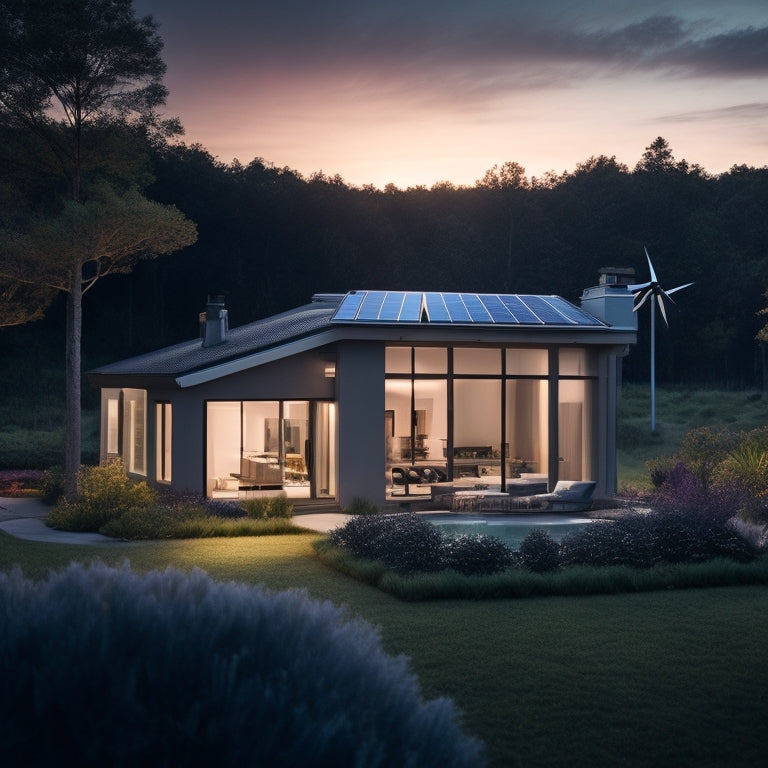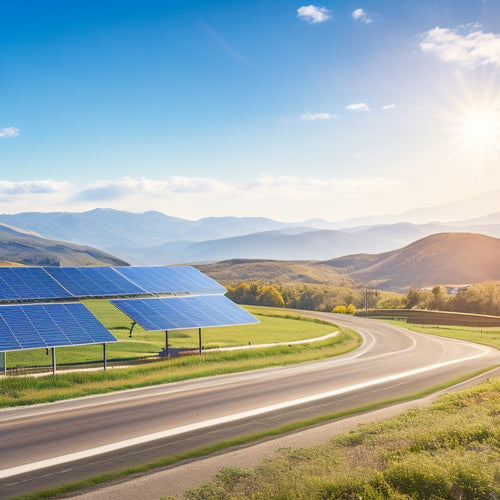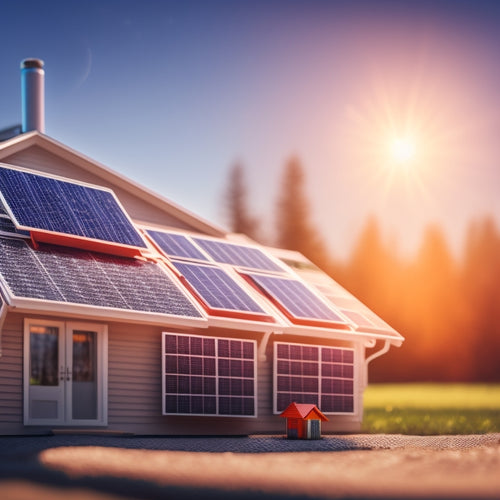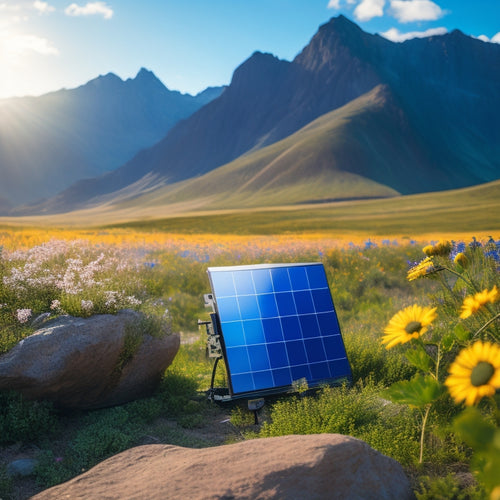
Elevating Home Energy Independence With Renewable Solutions
Share
By incorporating renewable energy solutions into your home, you're taking a vital step towards achieving energy independence. You can utilize solar, wind, biomass, or hydroelectric power to reduce your reliance on the grid and enjoy lower energy costs, increased energy security, and a reduced carbon footprint. With the right system design, energy storage solutions, and smart home integration, you can maximize your energy production and consumption. Now, you're ready to access the full potential of renewable energy and take control of your home's energy future – and there's even more to discover in this expedition towards energy independence.
Key Takeaways
- Renewable energy options like solar, wind, biomass, and hydroelectric power can significantly reduce reliance on utility companies and mitigate rate variability.
- Energy independence benefits include reduced energy costs, increased energy security, and environmental benefits like mitigating carbon footprint and promoting ecological balance.
- Energy storage solutions like battery backup systems ensure a consistent energy supply during low production periods and grid failures.
- Efficient home energy design involves optimizing energy flow, load balancing, and energy storage integration to minimize energy loss and maximize energy production.
- Smart home systems and integration enable real-time monitoring, data-driven decisions, and efficiency maximization, preparing homes for evolving energy needs.
Renewable Energy for Homes
As you consider severing your reliance on the grid, renewable energy for homes emerges as a viable alternative. You can utilize wind energy through turbines, utilizing consistent wind patterns and open spaces for ideal energy production siting based on prevailing wind direction.
Solar power solutions also offer reliable, renewable energy with minimal maintenance, making them suitable for rural areas. You can implement biomass systems that convert organic matter into power.
Hydroelectric options, though location-dependent, can also provide a reliable source of energy. Before investing, conduct an energy audit to identify areas for improvement.
Passive solar design and proper home insulation can greatly enhance energy efficiency. Microgrid technology allows you to store excess energy for later use.
Renewable incentives, such as tax credits, can offset the initial costs. By exploring these options, you'll be well on your way to achieving energy independence.
Benefits of Energy Independence
By achieving energy independence, you'll enjoy significant benefits that directly impact your wallet and the environment.
You'll reduce your energy costs by utilizing free renewable energy sources, increasing your energy security by relying less on the grid, and contributing to a cleaner environment by reducing your carbon footprint.
With solar power systems, you can break free from grid reliance and cultivate community pride through shared energy initiatives, while also decreasing dependence on utility companies.
These advantages will have a lasting impact on your lifestyle and the planet.
Reduced Energy Costs
Cutting loose from the grid means breaking free from the shackles of rising energy costs.
By generating your own energy, you'll reduce your reliance on utility companies and their fluctuating rates. This shift towards energy independence can lead to significant cost savings over time.
Here are three key benefits you can expect:
-
Lower monthly bills: With renewable energy, you'll produce your own power and reduce your energy consumption from the grid, resulting in lower monthly bills.
-
Improved energy efficiency: By investing in energy-efficient appliances and systems, you'll optimize your energy usage and minimize waste.
-
Long-term cost savings: Renewable energy systems like solar and wind power can last for decades, providing a long-term solution to rising energy costs and saving you money in the process.
Increased Energy Security
With renewable energy, you're no longer at the mercy of grid outages or natural disasters that can disrupt your power supply.
This means you'll experience increased energy security, which is critical for homes and families. By generating your own clean energy, you're taking control of your energy needs, ensuring a reliable and consistent supply.
This energy autonomy gives you peace of mind, knowing you're prepared for unexpected events. Additionally, renewable energy solutions enhance energy resilience, allowing your home to function independently of the grid during outages.
With a renewable energy system, you'll enjoy uninterrupted power, even when the grid fails.
Environmental Benefits
Renewable energy systems bring a significant reduction in greenhouse gas emissions, mitigating your carbon footprint and contributing to a cleaner environment.
By adopting sustainable practices, you can minimize your environmental impact and play a vital role in combating climate change.
Here are three key benefits:
-
Reduced air pollution: Renewable energy systems produce little to no air pollutants, improving local air quality and public health.
-
Conservation of natural resources: By utilizing renewable energy sources, you reduce your reliance on finite fossil fuels, preserving natural resources for future generations.
-
Protected ecosystems: Renewable energy systems help maintain ecosystem balance, preserving biodiversity and delicate ecosystems that support life on Earth.
Solar Power System Essentials
Your solar power system's core components are the photovoltaic (PV) panels, which convert sunlight into electrical energy. You'll need to choose the right type of solar panel for your system, considering factors like efficiency, durability, and cost. There are three main types of solar panels: monocrystalline, polycrystalline, and thin-film.
| Solar Panel Type | Efficiency | Cost |
|---|---|---|
| Monocrystalline | 15-20% | High |
| Polycrystalline | 12-15% | Medium |
| Thin-film | 7-14% | Low |
When installing your solar power system, consider the roof's orientation, size, and condition, as well as local building codes and permits. Proper installation is essential for maximizing energy production and ensuring a safe, reliable system.
Energy Storage Solutions Explained
Energy storage solutions play a vital role in ensuring a steady supply of power when the sun isn't shining or during periods of high energy demand.
As you evaluate renewable energy solutions for your home, it's important to understand the significance of energy storage. With popular and reliable battery backup systems like Tesla Powerwall and LG Chem RESU, you can enjoy a balance of capacity, durability, and affordability leading brands.
You'll want to investigate different battery technologies that cater to your specific needs. Here are three key aspects to examine:
-
Depth of discharge: The percentage of the battery's capacity that can be safely used without damaging the battery.
-
Cycle life: The number of charge and discharge cycles a battery can handle before its capacity starts to degrade.
-
Grid integration: The ability of your energy storage system to seamlessly interact with the grid, ensuring efficient and reliable power supply.
Efficient Home Energy Design
You'll want to evaluate optimizing energy flow throughout your home by strategically placing energy-efficient systems and appliances to minimize energy loss.
Smart home systems can also play an essential role in efficient home energy design, allowing you to monitor and control energy usage in real-time.
Optimized Energy Flow
Built upon a foundation of smart design principles, optimized energy flow enables your home to maximize its energy independence by streamlining the way energy is generated, stored, and consumed. This is achieved through effective energy management, which guarantees that energy is allocated efficiently to meet your home's needs.
To optimize energy flow, you should consider the following:
-
Load balancing: Distribute energy generation and storage capacity to match your home's energy demands, reducing waste and maximizing self-sufficiency.
-
Energy storage integration: Incorporate energy storage systems, like batteries, to store excess energy generated during the day for use during periods of low energy production.
-
Real-time monitoring: Implement a monitoring system to track your home's energy generation, storage, and consumption in real-time, allowing you to make data-driven decisions to optimize energy flow.
Smart Home Systems
By integrating optimized energy flow into your home, you've taken a significant step towards energy independence.
Now, it's time to take it to the next level with smart home systems. These advanced solutions enable you to monitor and control your energy usage in real-time, making adjustments on the fly to maximize efficiency.
With smart thermostat integration, you can optimize your heating and cooling systems to reduce energy waste. Energy monitoring apps provide you with detailed observations into your energy consumption, helping you identify areas for improvement.
Maximizing Solar Panel Output
Optimizing your solar panel system's performance is vital to utilizing the full potential of renewable energy for your home. You can maximize your solar panel output by guaranteeing your system operates at peak efficiency. This involves regular solar panel maintenance, including cleaning and inspecting your panels for damage or debris.
Additionally, you should monitor your inverter's efficiency, as it plays a key role in converting DC power to AC power for your home.
To further enhance your solar panel output, consider the following:
- Proper system sizing: Confirm your solar panel system is correctly sized for your energy needs to avoid under or overproduction.
- Optimal panel angle and orientation: Position your solar panels at the ideal angle and orientation to capture the most sunlight.
- Efficient energy storage: Invest in a high-quality energy storage system to store excess energy generated during the day for use during the night or on cloudy days.
Frequently Asked Questions
Can I Mix Different Types of Renewable Energy Systems in My Home?
You can combine different renewable energy sources, like solar and wind power, into hybrid systems, and pair them with energy storage solutions, like batteries, to guarantee a reliable and efficient energy supply in your home.
How Do I Ensure My Renewable Energy System Is Compatible With Grid?
You'll need to guarantee grid compatibility by selecting a renewable energy system that meets local grid connection standards, and consider energy storage options to stabilize output, allowing seamless integration with the grid when you're not consuming all the generated power.
Are There Any Government Incentives for Home Renewable Energy Adoption?
You're not alone in adopting renewable energy: 1 in 5 US homes now use solar power! You can benefit from federal tax credits, covering up to 26% of installation costs, and state rebates, which vary by location, to offset your investment.
Can I Sell Excess Energy Generated Back to the Power Grid?
You can sell excess energy back to the grid through net metering benefits, which measure production and consumption, or energy buyback programs, where utilities purchase surplus energy at a predetermined rate, offsetting your energy costs.
Do Renewable Energy Systems Require Frequent Maintenance and Repairs?
"An ounce of prevention is worth a pound of cure" - you'll find that renewable energy systems, like solar panels, require minimal maintenance and infrequent repairs, ensuring system longevity, while performance monitoring and installation requirements help optimize efficiency and reduce maintenance costs.
Related Posts
-

Is Switching to Green Energy Solutions Easy
Switching to green energy solutions isn't just easy; it's also beneficial. You can greatly cut utility costs and enjo...
-

A Beginner's Guide to Navigating the Solar Investment Tax Credit
You're eligible to claim a significant Solar Investment Tax Credit (ITC) of 30% of total installation costs, but mane...
-

High-Efficiency Solar Battery Chargers for Remote Areas
High-efficiency solar battery chargers are essential for your off-grid energy needs in remote areas. They maximize en...


